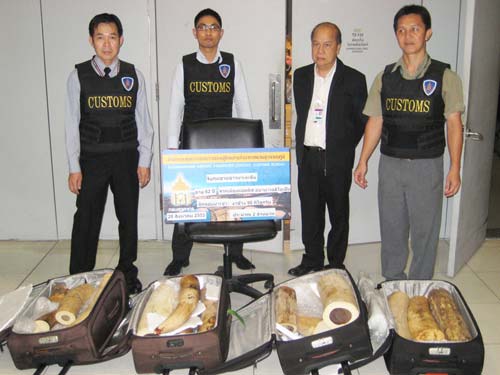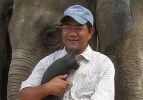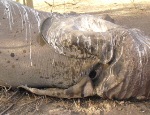Customs officials found 16 pieces of cut ivory on searching a 62-year-old Malaysian man at Suvarnabhumi International Airport in Thailand in August. Recently released information shows that the traveler was carrying nearly 200 pounds (90 kilograms) of ivory in four suitcases after arriving from Addis Ababa, Ethiopia.
“The Thai Royal Customs is committed to taking strong measures to ensure that proper legal import and export procedures under the Convention on International Trade in Endangered Species of Fauna and Flora is adhered to at every check-point across the country especially Suvarnabhumi Airport,” Mr. Ekalarp Rattanarut, Director of Suvarnabhumi Airport Passenger Control Customs Bureau said in a statement.
Customs officials at Suvarnabhumi International Airport have made a startling number of seizures of ivory this year, totaling almost 2 tonnes of illegal ivory.
“The customs officers responsible for this ivory seizure in Thailand are to be commended, although the fact this trade continues illustrates that Thailand’s domestic ivory market remains a serious issue,” Chris R. Shepherd, Deputy Regional Director of TRAFFIC Southeast Asia said in a press release. “Unless Thailand starts making ivory seizures in the marketplace, we fear its ivory trade will continue.”
Thailand is among the top three countries—also including Nigeria and the Democratic Republic of Congo—in the illegal ivory trade, according to Elephant Trade Information Systems (ETIS) a database managed by TRAFFIC.
Although ivory is banned by the Convention on International Trade in Endangered Species (CITES), elephant poaching has been on the rise in recent years both in Africa and Asia. Currently the IUCN Red List lists the Asian elephant (Elephas maximus) as Endangered and the African elephant (Loxodonta africana) as Vulnerable. The forest elephant (Loxodonta cyclotis), which some consider a separate species, has not yet been evaluated. All of the world’s elephants are threatened by habitat loss and poaching.

Customs officers with smuggled ivory. Photo by: Suvarnabhumi Airport Passenger Control Customs Bureau.
Related articles
One man’s mission to save Cambodia’s elephants

(05/17/2010) Since winning the prestigious 2010 Goldman Environmental Prize in Asia, Tuy Sereivathana has visited the US and Britain, even shaking hands with US President Barack Obama, yet in his home country of Cambodia he remains simply ‘Uncle Elephant’. A lifelong advocate for elephants in the Southeast Asian country, Sereivathana’s work has allowed villagers and elephants to live side-by-side. Working with Fauna and Flora International (FFI) he has successfully brought elephant-killing in Cambodia to an end. As if this were not enough, Sereivathana has helped curb the destruction of forests in his native country and built four schools for children who didn’t previously have formal education opportunities.
A nation of tragedies: the unseen elephant wars of Chad
(05/12/2010) Stephanie Vergniault, head of SOS Elephants in Chad, says she has seen more beheaded corpses of elephants in her life than living animals. In the central African nation, against the backdrop of a vast human tragedy—poverty, hunger, violence, and hundreds of thousands of refugees—elephants are quietly vanishing at an astounding rate. One-by-one they fall to well-organized, well-funded, and heavily-armed poaching militias. Soon Stephanie Vergniault believes there may be no elephants left. A lawyer, screenwriter, and conservationist, Vergniault is a true Renaissance-woman. She first came to Chad to work with the government on electoral assistance, but in 2009 after seeing the dire situation of the nation’s elephants she created SOS Elephants, an organization determined to save these animals from local extinction.
Rise in poaching pushes CITES to vote ‘no’ to ivory sales
(03/22/2010) The Convention on International Trade in Endangered Species (CITES) has pleased conservationists with its decision to not allow the one-off sales of ivory from government stockpiles in Tanzania and Zambia given the recent rise in elephants poaching in Africa.








